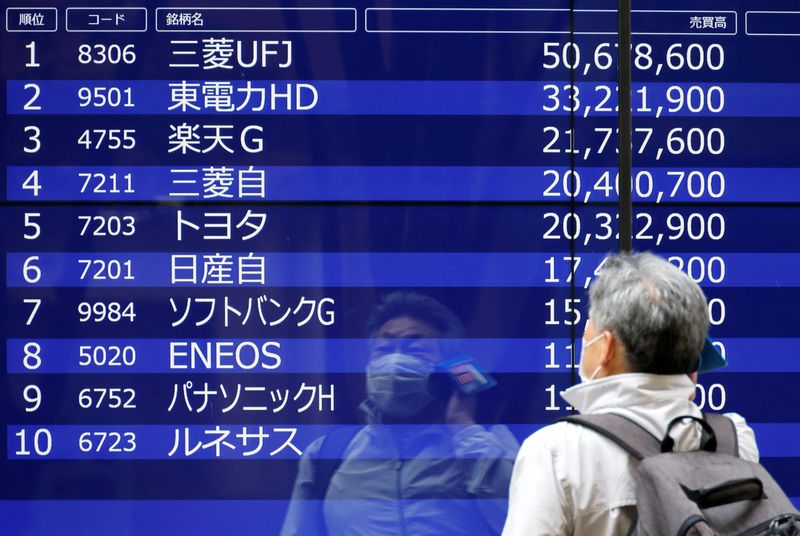
© Reuters. FILE PHOTO: A man is reflected on an electric monitor displaying a stock quotation board outside a bank in Tokyo, Japan, June 5, 2023. REUTERS/Issei Kato/File Photo
By Tom Westbrook
SYDNEY (Reuters) – The yen gained in volatile trade on Friday and stocks and bonds dropped in Tokyo after the Bank of Japan made another baby step away from years of ultra-loose monetary policy, while hopes for stimulus had Chinese stocks heading for their best week of the year.
The Bank of Japan maintained its super-low interest rates but shifted slightly on yield curve control, saying its 0.5% limit on 10-year government bond yields was now a “reference” and offered to buy such bonds at 1% in the market instead.
The BOJ’s shift caps a big week for central banks, with interest rate rises in the U.S. and Europe in recent days seen as the final moves in the most aggressive hiking cycle in a generation.
It could also have seismic implications for global money flows, since a cheap yen that’s been inexpensive to borrow has been a mainstay of capital market funding for years and it now faces upward pressure from rising Japanese yields just as global rates seem to peak.
Ten-year Japanese government bond yields hit a nine-year high of 0.575% and the dropped 0.4%, with financial stocks surging in anticipation of higher rates.
The yen which had gained for days on speculation of a BOJ move, was choppy after the announcement, before gaining to hit a week-high of 138.05 to the dollar.
“They’ve changed (yield controls) without committing to too much and want to be more flexible about how they run monetary policy,” said Sally Auld, chief investment officer at JB Were in Sydney.
“We’re really at the beginning of the end of really extreme monetary accommodation but they still sound very cognisant of … downside risk to the economy and inflation outlook.”
The BOJ repeated that inflation is not sustainably at its 2% target and forecast it below that level in 2024 and 2025, even though data showed Tokyo’s core consumer price index rose 3% year-on-year in July.
“It is an important step towards eventual disbandment,” said Tom Nash, a fixed income portfolio manager at UBS Asset Management in Sydney. “I expect yields will gravitate towards 1% but not get there in a straight line as you’re likely to get short covering, domestic buying and the BOJ leaning against it.”
rose 0.3% with help from after-market gains driven by profits at Intel (NASDAQ:). European futures were flat and futures down 0.3%.
Ten-year U.S. Treasury yields, which had climbed overnight on stronger-than-expected U.S. data and talk of Japan’s tweak, stayed above 4%.
SOFT LANDING
Elsewhere in Asia, MSCI’s broadest index of Asia-Pacific shares outside Japan rose 0.2% and was heading for a weekly gain of more than 2%, led by bouncing stocks in Hong Kong and China.
China needs measures such as lower home mortgage rates to help spur home purchases, state media quoted the housing minister as saying, sparking a rally in property shares.
The U.S. dollar was broadly stronger, especially against the Australian dollar – down 0.6% to $0.6666 – which was weighed after retail sales suffered their biggest fall of the year in June, suggesting less need for another rate hike.
Earlier in the week, the European Central Bank raised rates by 25 basis points to a 23-year high, as expected, but President Christine Lagarde sent the euro tumbling with talk of a pause in September.
The euro slid nearly 1% and nursed losses at $1.0980 on Friday. Early German inflation data indicated a slowdown in July, and French figures later in the day along with Eurozone data next week will determine the outlook.
Very weak business activity readings earlier in the week showed hikes are starting to bite.
On Wednesday, the Fed had also hiked by 25 bps and investors were cheering a glimpse of the fabled “soft landing” for the economy as the central bank no longer forecasts a recession.
futures slipped slightly from three-month highs to $83.90 a barrel.
>>> Read full article>>>
Copyright for syndicated content belongs to the linked Source : Investing.com – https://www.investing.com/news/economy/stocks-slip-yen-surges-on-speculation-of-bank-of-japan-policy-tweak-3136811
